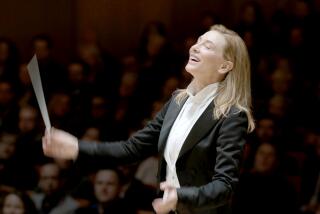ENSEMBLE 13: NEW HARMONY FROM GERMANY
Germany has undoubtedly produced the bulk of household-name composers in Europe since the beginning of time, it seems: from Heinrich Schuetz to the Three Bs to the New Viennese School to Karlheinz Stockhausen. But donât feel badly if the composers represented on the program by the German group Ensemble 13 in a Monday Evening Concert at the County Museum of Art fail to ring any bells.
Detlev Muller-Siemens, Arvo Paert and Wolfgang Rihm are, nonetheless, prominent names in Germany and, in fact, most of Europe.
And thatâs one of the reasons Ensemble 13, based in Karlsruhe, is making its first tour of North America (under sponsorship of the Goethe Institute): to bring audiences on this side of the globe up to date with musical happenings on the other side.
Manfred Reichert, conductor and founder of the group, agrees that, thus far, Americans have been more attracted to their 18th- and 19th-Century programs than the contemporary agendas.
âPeople are even more traditional here than in Germany,â he said through his interpreter-wife Hannah, during a three-way telephone conversation from San Francisco. âBut I believe people here are interested in new music. We would like to come back some day and stay for a while.â
So, who are the new German composers? Arvo Paert (represented on Monday by his âTabula Rasaâ) has actually adopted Germany as his home: The Estonian-born composer is currently living in Berlin. Reichert described his music as âminimalist, or something like that.â
Muller-Siemens (who was born in 1957) is a member of what Reichert describes as the New Tonality school in Europe. âItâs a return to harmony,â he said. âOr a little bit back to harmony. No one breaks any pianos or cellos or anything, but it is still maybe a little hard to listen to.â Muller-Siemensâ contribution to the program seems to suggest this âreturn to harmony.â Itâs called Variations on a Laendler of Franz Schubert.
The Variations, Reichert explained, were written for a Schubertian concert in 1978, honoring the 250th anniversary of the composerâs death. âI asked five composers to think about Schubert and to write what they thought. Muller-Siemens thought about his harmonies. The theme you will hear clearly. The seven variations? . . . â His voice trailed off.
Another composer who contributed a piece to the Schubert concert was Wolfgang Rihm (born in 1952), who dominates the Monday concert with three of his eight âChiffresâ (French for sign or gesture). According to Reichert, Rihm is âthe most popular composer in Germany now, even more so than Stockhausen.
âHis music is not experimental, but more traditional. He is unique--not at all like musicians of the â50s and â60s who were making progressive music.â And what of Rihmâs style? Reichert answers enigmatically, âHe is just writing music. In a wide sense, I suppose you could call him a New Romantic, but heâs always composed like that--ever since he was 14.
âHe writes out of his stomach.â Undoubtedly, something is lost in translation here.
The ensemble itself, Reichert explained, was formed in 1973 in Baden-Baden, where Reichert was a conductor and radio producer. âA group of musicians from various orchestras in town began playing without a conductor. Eventually, they asked me to lead them.â
Ensemble 13 is similar in structure to the Chamber Society of Lincoln Center--a floating pool of musicians ranging from the original 13 (hence the name) to as many as 40. The group currently touring North America numbers 28.
âWe play all kinds of music,â Reichert said, âthough we focus on contemporary.â The new-music movement is strong in Germany he says. The reason is simple: âThe state and city governments there give monies to encourage new works to be written. In fact, in Karlsruhe, we have two annual government-sponsored festivals just for new music.â
More to Read
The biggest entertainment stories
Get our big stories about Hollywood, film, television, music, arts, culture and more right in your inbox as soon as they publish.
You may occasionally receive promotional content from the Los Angeles Times.










